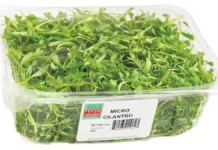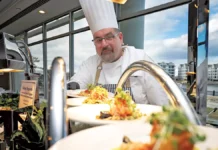When most people hear the word “garbage,” they usually think, newspapers and plastic bags and paper plates and napkins. But what about food?
That would seem a fairly benign type of waste but the reality is that it’s very heavy, and when it sits in landfills, it rots.
“Several years ago I read an article about vineyards in Northern California having a problem with what to do with the leftover organic grapes from the wine they made,” says Jim Slanina, president of EnviroPure Waste Disposal Systems. “At that time it was considered waste no one wanted, and getting rid of it was very expensive.”
It piqued his interest, he says. “I saw there was going to be a need to handle the organic volume generated now and in the future so I wanted to come up with a technology to address that need – on-site – without having to drive trucks back and forth. If composting’s your thing, trucks are still needed.”
Getting rid of waste is very costly. “There’s pick-up, environmental surcharges, fuel surcharges, tipping fees. It can be prohibitive,” says Slanina. “Since food is so heavy, it’s a pretty big portion of waste.”
Jona Thomas, national sales manager, notes that getting rid of waste can cost foodservice operations between $75 and $150 a trip.
EnviroPure came up with a organic waste treatment system that converts food waste to what ultimately becomes what is called “gray water,” a liquid that meets or exceeds all municipal standards for waste disposal.
The organic waste starts with a grinding process– either a sink-type grinder for smaller operations or a large grinder, and the grinding process reduces the particle sizes to allow for a greater absorption of the micro nutrient, which aids in quick digestion. “The slurry is pumped into the digestion vessel, which goes through a series of settlings and stirrings, just like our stomachs,” Thomas says. The slurry is then mixed with the company’s proprietary EP-BioMix. This process takes a few hours for fruits and vegetables, and under 24 hours for meats, bones, shells, and pits.
EnviroPure’s EPW Food Waste Disposal system is a self-contained, continual-feed, organic waste disposal system that fits into any supermarket, commercial or industrial kitchen operation, allowing food waste to be dealt with as it is generated at the source. “It uses the EP-BioMix medium that provides the natural bacteria already present in the food with the critical micro nutrients required for rapid breakdown of food,” Thomas points out.
“Organic waste is quickly reduced to a harmless liquid that is odor-free and can be safely disposed of into existing municipal waste water systems,” says Slanina. “EPW systems handle virtually any kind of food waste, including vegetables, fruits, meat, fish, poultry, dairy products, bones, shells and pits, with complete decomposition typically occurring within 24 hours.”
These units are particularly valuable in the foodservice industry, says Slanina. “EnviroPure units are custom- designed units that fit into a kitchen’s work flow. We not only provide a easy solution, we design the systems to increase productivity and capture the organic waste in the dish-washing area and the food prep area.”
The biggest difference between the company and its competitors, Slanina and Thomas say, is BioMix, the complete, natural vitamin mix the company uses to “digest” and treat the waste. “Others use microbes or enzymes that are chemically engineered, not a natural product,” says Thomas. Enzymes tend to emulsify the food recycling in a high contaminated byproduct. We turn it into gray water, then treat our gray water with our vitamin mix and it comes in at a tenth of what’s allowed in most municipalities.”
This gray water can then be poured into drains, or collected or used for irrigation purposes. “It can even be recycled back into our system and used as our grinding water instead of potable water,” says Thomas.
And the systems pay for themselves. “It costs the end user $28 per ton for our BioMix, well below the national average for waste removal in the US and Canada,” she notes. And the machine can save big money because it costs less than $400 a year in utility costs, using the water extracted from the food rather than having to buy additional water.
In addition to everything else, the company also provides customers with a program where end users – tasked with increasing diversion rates and reducing their carbon footprints – can now see visually what those rates are.
EnviroPure is sold through the foodservice distribution channel. Distributors can benefit from selling the systems because they can not only help their customers save money, they also aid foodservice operations in complying with the regulations that are now going into effect in many cities, like New York, to ensure that organic matter does not go into landfills.
Coming in the future is a closed loop system, which takes the effluent through an ozination – or purification – process. ”Since our grinding process allows us to use our own water, this process also greatly reduces the amount of gray water returned to the environment,” says Thomas.
The company also offers a remote monitoring program that troubleshoots systems in the field, from its corporate office and supplies end users with valuable information to increase their diversion rate and decrease their carbon footprint.
But probably what separates EnviroPure from the rest of the field is, as compliance becomes more mandated, its ability to help businesses now in cities that don’t have strict sewer discharge regulation and are therefore going to be mandated foodservice operations to cut back on waste. The EP machine discharge is typically one tenth of most municipal sewer discharge regulations. “We fall way below anything that’s coming, where the new regulations are now and where they’re going, and you can’t say that about our competitors,” says Thomas.
























